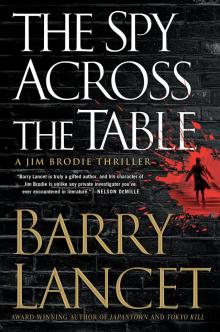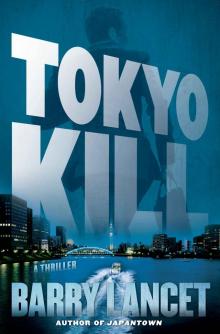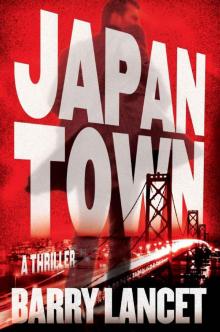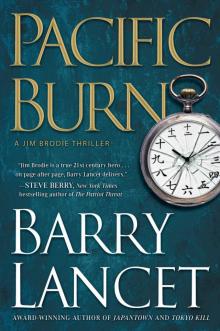- Home
- Barry Lancet
The Spy Across the Table
The Spy Across the Table Read online
Thank you for downloading this Simon & Schuster ebook.
* * *
Get a FREE ebook when you join our mailing list. Plus, get updates on new releases, deals, recommended reads, and more from Simon & Schuster. Click below to sign up and see terms and conditions.
CLICK HERE TO SIGN UP
Already a subscriber? Provide your email again so we can register this ebook and send you more of what you like to read. You will continue to receive exclusive offers in your inbox.
This one is for Renee, Michael, and Haruko
And for Melbourne Weddle, family, friend, fan, Korean War veteran, Dashiel Hammet enthusiast, and so much more
Fall down seven times, stand up eight.
—JAPANESE PROVERB
CHAPTER 1
DAY 1, SUNDAY, 3:00 P.M.
THE KENNEDY CENTER, WASHINGTON, DC
MIKEY was shot because he begged me for a favor and I complied.
My old college buddy and I stood in the wings of the Kennedy Center’s Opera House theater, watching a Kabuki play unfold in front of a sold-out crowd. VIPs were abundant.
Mikey was starstruck. While everyone in the audience tracked the mesmerizing movements of the Japanese players in their colorful robes, Mikey focused on the bigger picture. Yes, he took in the artistry of the actors, but his expert eye also cataloged the exquisite details of the backdrops, the exotic sweep of the pageantry, and how each played off the other.
“Her costume and makeup are perfect,” Mikey said in a low voice. “Is that really a man under there?”
My friend’s emerald-green eyes sparkled as he soaked up the spectacle. Onstage, snowflakes wafted down. A woman in an elaborately embroidered kimono cooed plaintively for her lover. The expression of emotional turmoil on her face was sublimely complex, half-hopeful even as it plunged toward despair.
“Yes,” I said.
Early in seventeenth-century Japan, the shogun famously banned women from the Kabuki stage. The elegantly clad females proved too much of a temptation for aristocratic samurai, who were expected to set an example for the common people by staking out society’s moral high ground. Over time, the long-standing men-only policy evolved into a tradition that persists to this day.
Mikey remained incredulous. “Are you absolutely sure?”
“I’m certain of it.”
Kabuki troupes wasted no time in seeking men with the prowess to play women. Costumes were upgraded. Makeup was subtly altered. Gestures demure and flirtatious were endlessly practiced and refined, then perfected. The Kabuki experience reached new heights. Even today, Kabuki continued to win converts. Transfixed, Mikey was clearly another. Before him, an actor in snow-white makeup, coiffed wig, and ruby lips uttered a soft lament.
“What’d she say, Brodie?”
She. I told him.
“Brilliant,” he whispered. “The mood of the lighting and even the set itself echoes her sentiment.”
Michael C. Dillman was a production designer. He created sets for movies. Tonight he was a kid in a candy store. We’d run into each other at San Francisco State, where we shared the same artistic sensibilities. Mikey funneled his into set design. I channeled mine into a store selling Japanese art and antiquities out on Lombard, west of Van Ness Avenue.
“How is it you two never met?” I asked, a reference not to the “temptress” onstage but to Sayuri “Sharon” Tanaka.
My old college buddy blushed. “I . . . I just never found the time.”
I smiled at his transparent evasion.
Mikey was shier than shy, even with two Oscar nominations and one win under his belt. Sharon Tanaka was a famed Japanese designer for stage and screen and had been hired to create special backdrops for the Kennedy Center production.
“Did I thank you for getting me in to see her, Brodie?”
Mikey was a longtime admirer of Sharon Tanaka’s work.
“Yes. More times than I can count.”
Sharon and I were friends and frequented some of the same art circles in Tokyo. When Mikey had heard she would be traveling to Washington with the Kabuki troupe, he asked me to arrange a meeting.
“This is a dream. Thanks, man. I owe you.”
“No, you don’t,” I said.
From under a disheveled bush of auburn hair, his eyes glowed with a gratefulness I found embarrassing. I glanced away, recalling the first time I’d seen the look. We were college roommates for a while, sharing a near-campus apartment. I got a dose of the look when I gave him the larger bedroom, because even back then he was hauling around cumbersome stage paraphernalia.
Mikey checked his watch. “Time to go see the grand lady. Thanks again, man.”
“Stop saying that. Maybe one day you two can collaborate.”
Mikey grew wistful at the thought. “That would be nice. Wish me luck.”
“You don’t need any. Just enjoy the get-together.”
Turned out I was wrong.
He needed luck in the worst way—and didn’t get it.
CHAPTER 2
THE muffled sound of a gunshot reached my ears during the fireworks scene, and momentarily my thoughts strayed from the spectacle before me to Mikey and Sharon.
Onstage, faux Roman candles shot glittering starbursts into the air. The bouquets of color enthralled onlookers and temporarily deafened performers.
In the wings, the echo of gunfire alerted all who could decipher the backroom volley. Which turned out to be two wired-up Secret Service agents and me. An American staffer from the running crew turned her head toward the distant pop, then dismissed it.
The Secret Service agents reacted instantly. Their presence confirmed the attendance of VIP heavyweights. With an event as rare as a Kabuki performance all the way from Tokyo, a heady cocktail of luminaries was guaranteed. No doubt a good sampling of senators and cabinet secretaries and ranking diplomats were in the theater. Rumors placed members of the White House family on hand as well.
The discharge had been partially muted either by distance or a closed door. Possibly both. The direction suggested the vicinity of the dressing rooms.
Where Mikey was meeting his idol.
Maybe I should wander back and check on my friends.
I cast a last look at the actors onstage. The woman character, wrapped in kimonoed elegance, collapsed to her knees in slowly unfolding agony. Her samurai lover brandished his sword with justifiable fury, hoping for a chance to strike down the villain who, by pulling political strings from the shadows, had snared the twosome in his web. Having set a trap of their own, the star-crossed pair hoped to lure him from hiding, but to the end he’d outfoxed them.
Saddened, defeated, and resigned, the couple froze, assuming a final dramatic pose. The moment was poignant. Into the stillness of the scene, a new round of fireworks released a climactic series of thunderclaps, sending out rivers of sparks arching over the heads of the doomed lovers. More than one jaw in the crowd slackened. More than one eye glistened.
In the midst of this fresh cascade came a second gunshot.
The dressing rooms it was.
I moved toward the rear, a nameless fear clawing at me.
Out front, the first of three mini-plays wound up. The theatergoers broke into a rousing applause. Cheers rose up. I heard the rustle of the crowd rising to its feet for a standing ovation. But when I looked back over my shoulder, in the dim recesses of the box seats I glimpsed dignitaries being ushered from their privileged places by shadowy guards.
Near me, a Secret Service agent with a sharp nose and roving eyes spoke hurriedly into the microphone at his wrist while his vigilant partner kept a watch on the back. I slid past them. The second man called after me but I ignored him.
A third shot ran
g out.
I broke into a run, my insides swamped with a rising dread, my black sneakers beating the backstage flooring. Five seconds later, footsteps pounded the path in my wake. One of the agents, I guessed.
The changing area turned out to be a perplexing maze of narrow halls and unpredictable turns. I’d heard about this. Temporary quarters had been erected for the flood of actors arriving from Tokyo.
No one was around, so I plunged into the network of plywood passageways. They were murky and ill-lit, the illumination from the small bulbs in the rafters overhead filtering down unevenly. A series of random turns brought me to a large communal area somewhere in the center of the makeshift paneled city, where I faced three routes, each winding away in a different direction.
A band of Japanese staffers fell silent when I appeared. These would be the wardrobe and makeup people charged with maintaining the props and helping the actors with their costume changes.
I took in the surroundings as I noted that footsteps no longer echoed in my wake. The space overflowed with racks of sumptuous Kabuki robes along one wall and spears and swords at another. On a long table against a third wall, the coiffed wigs of Japanese aristocrats, samurai, and courtesans bristled with topknots for the men and colorful lacquered hair ornaments for the women.
“Where is Tanaka’s room?” I asked the group.
They stared back at me without comprehension. What was I thinking? Few, if any, would speak English. Fewer still would speak firearms. Gun control was fiercely enforced in Japan, the guttural crack of a handgun as alien to their ears as Swahili.
“The set designer, Tanaka-san,” I said in Japanese. “Where can I find her?”
Heads bobbed, then one staffer pointed to an opening bathed in muddy hues of gray and brown. “Turn left at the end, then right at the second lane.”
I nodded my thanks and sprinted into the dark hall. When I veered left at the junction, the shadows lengthened. Black cords bundled together with scarlet electrical tape ran like coral snakes along the bottom edges of the makeshift walls, then slithered underneath the plywood into individual quarters. Weak bands of light spilled from the gaps below doors.
I swung right in time to catch a light-skinned figure in a ball cap slipping from a room at the end of the corridor, tucking a gun into a shoulder holster under a coat. I registered size and shape and skin tone but couldn’t grasp gender. Any long hair could be tucked under the hat.
“Hold it right there,” I said loudly, not expecting him or her to listen.
Which proved to be the case.
Without looking back, the shooter picked up speed and disappeared around a corner.
I raced after the fleeing form. My shout caught the attention of actors readying for the next play, and doors creaked open. Heads appeared.
“What’s happened?” one of them asked.
I didn’t stop to answer. As I charged past the dressing room from which the suspect had emerged, I glanced in. The acrid smell of cordite rolled over me, then the tangy copper scent of blood.
There were two bodies in the unlit room.
Two.
No no no, I thought. Not them. Don’t let it be them.
I dashed into the room and the forms clarified in the gloom. It was them. Mikey and Sharon were sprawled across the floor, dark crimson pools spreading out around them. I dropped to my knees.
This was bad. There was far too much blood.
Sharon had taken two shots in the chest. Mikey’s wound was higher up, between the heart and the collarbone, as if he’d been in motion when the trigger was pulled. Sharon had no pulse, but I felt a faint beat at Mikey’s neck.
I grabbed a towel off the dressing table and used it to stem his bleeding. Then I did the same for Sharon. Ghostlike, cast members crept forward from the muddy brown haze of the hall and crowded around the entrance.
In the back of my head, a clock was ticking. The retreating figure was twelve seconds gone.
I laid one hand over the other on Sharon’s chest and began pumping. Rapid chest compressions from the CPR playbook. Three, four, five times. I stopped and passed a hand under her nose. Nothing. I hammered home a second series, glancing up at the gathering in the doorway as I worked.
Twenty-five seconds gone.
“Any of you know CPR?” I asked in Japanese.
“We do,” a man at the back said. “I’m a doctor and my assistant is a nurse and physical therapist.”
The medical personnel traveling with the troupe.
“Great,” I said. “Can you take over? The man’s got a pulse. The woman doesn’t.”
They jumped right in. The doctor dealt with the CPR; the nurse rushed to Mikey’s side. I watched until I could verify the self-proclaimed medical staff knew what they were doing.
Thirty-five seconds gone.
“Anyone here speak English?” I asked, again in Japanese.
A young actor in the doorway said, “I do. I study UCLA two years.”
“More than enough,” I said, switching to English and enunciating clearly so he could catch the phrases he would need to use. I told him to run up front to the wings, ask for the first-aid station, and bring the defibrillator, the device that uses an electric shock to start the heart. At the same time he should have someone call 911, the emergency number in the U.S. After that, he needed to show a second person the location of the dressing room so the paramedics could be guided through the maze.
“Got all that?” I said.
“Yes.”
“Good, then I’m off.”
I bolted after the shooter, wondering if the fifty-five seconds I’d used to buy my friends a fighting chance had given the killer enough time to escape.
CHAPTER 3
I FOLLOWED in the footsteps of the shooter, turning the same corner, then seconds later hit my first setback.
Twenty feet ahead the hall smacked into a T-junction. I peered down both legs. The left side circled back around toward the stage in a wide, lazy arc. The right leg drove deeper into the depths of the theater.
I hovered indecisively. Which way had the assassin gone? Was I too late?
Before I could decide, on the other side of an unvarnished plywood wall to my left, I heard an electric surge followed by a flat thud. Buzz-thud. A pressed button followed by a mechanical refusal. Or maybe it was a failure in the machine. The button was pushed again. First tentatively, then with more insistence. Repetitive jabs, each effort more forceful than the last. More demanding. In growing frustration. Once, twice, three times. And every time the mechanism jumped to life then died—buzz-thud, buzz-thud, buzz-thud.
Four or five yards away, someone was attempting to access a back way out. A cargo bay or an emergency exit. Someone unaware that major access points would be locked down with VIPs in the house. Or someone aware of procedure but trying to breach the system anyway.
Had to be the shooter.
No one else would be back here during show time. Not with the chance to catch a high-priced performance all the way from Japan for free.
I turned toward the sound. The hall before me banked left and looped back toward the front of the theater. Uninterrupted plywood paneling lined the outer edge of the corridor, while dressing room doors punctuated the inner wall.
Beyond the plywood barrier the killer hit the button twice more. Buzz-thud, buzz-thud. An angry muttering ensued as the door continued to resist. It was a foreign cadence, though not Japanese. The voice was too low to distinguish language but loud enough to supply hints: to light-skinned I added male, lower register, and ragged cadence.
I could think of only one reason why the assassin lingered near the rear exit, cursing. His escape plan had gone off script. He’d lost his way in the labyrinth, or his prearranged exit had been unexpectedly barricaded.
The attacker gave up on the door and moved off, still uttering expletives under his breath. This time I pegged the language as Spanish. Another fact to be tucked away.
I followed side by side along a pa
rallel course, with only an eight-foot-high divider between us. This is for Mikey and Sharon, I told myself. Wait for the cops and he’ll be gone.
I kept my breathing low, my footfalls silent. I could make out the spongy exhale of his sneakers. With each step, cushioned soles surrendered air to the cement flooring painted a Mediterranean blue.
Up ahead a rear entrance to the dressing area loomed. I eased up, alarmed. What if the gunman reentered the maze? The sane choice would be to plot a course along the walls of the theater until it led to another exit. But logic was no guarantee of action.
On the other side of the barrier I heard the shooter pause. He’d spotted the door. I pressed myself behind the curve of the wall and waited.
The next instant he started off again, his footsteps receding. I reached the door in three bounds and snagged the steel handle. I pulled. The portal swung wide. Somewhere inside the laminated timber, a poorly glued layer strained and creaked. The wood’s protest echoed through the high-ceilinged chamber overhead.
I froze.
The retreating sound of compressed footwear ceased.
CHAPTER 4
THE killer stood motionless a good fifteen feet beyond the doorway, attuned to the disruption. Far enough away so that, with the curvature of the wall and the backstage gloom, a glance to the rear might not reveal the open door.
I held my breath.
He listened.
The silence was acute.
Five seconds passed.
Then ten.
Then he pushed on again.
I let him go, giving him a longer lead before easing through the door.
I shot a look to the rear, searching for the unyielding exit, and saw a freight entrance. There was a galvanized steel shutter and a forklift. Passage for oversize props, backdrops, and anything else of bulk. But not the assassin. Not now.
Up ahead I glimpsed the wing where Mikey and I had watched the kimonoed actor croon a lover’s lament. As before, visitors and staffers hovered there. But in place of the two Secret Service agents, uniformed patrolmen had established a perimeter.

 The Spy Across the Table
The Spy Across the Table Tokyo Kill
Tokyo Kill Japantown
Japantown Pacific Burn
Pacific Burn